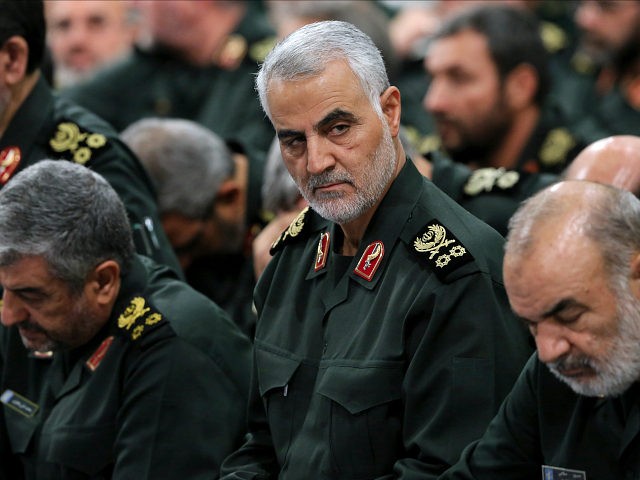Major General Qasem Soleimani, the commander of the notorious Quds Force division of Iran’s Islamic Revolutionary Guard Corps (IRGC), has reportedly been seen in Iraq advising Shiite militias in their attack on the Kurdish Peshmerga, a major U.S. battlefield ally against the Islamic State.
Soleimani was involved in talks between Iran-backed “Popular Mobilization Forces” (PMF) militia units and Iraqi Kurds on Sunday, not long before the first reports of armed clashes between the PMF and Peshmerga. Soleimani’s Quds Force, which Iran employs to destabilize adversary governments across the Middle East, was instrumental in training and arming the Shiite-dominated militia groups against the Islamic State (ISIS), which is organized around a version of Sunni Islam.
Soleimani reportedly “arrived in the Iraqi Kurdish region on Saturday and visited the tomb of former Iraqi president and Patriotic Union of Kurdistan party leader Jalal Talabani, who died on October 3 after years of poor health,” according to a report at the National.
The sincerity of this apparent gesture of respect to the Kurds is debatable since it wasn’t long before fire was exchanged between the Kurds and PMF. National University of Singapore Senior Research Fellow Fanar Haddad suggested to the National that Soleimani’s public appearance might be better interpreted as a demonstration of Iranian influence, saying, “It seems that whenever Iraq approaches breaking point, as happened in 2014 and now in 2017, Iran sends its man in Iraq to try to sort out the situation.”
Perhaps Soleimani’s seemingly courteous visit was also meant to intimidate the Kurds. If so, it did not work, because on Sunday the Kurdish leadership rejected Baghdad’s demands to renounce the successful independence referendum held in September.
“The Kurdish leadership has been calling for dialogue, negotiations and for direct talks with Baghdad for a very long time. Baghdad has refused to sit with us on the negotiation table and will, therefore, be responsible for any further escalation of tensions,” complained Kurdistan Regional Government Foreign Minister Mustafa Falah, who went on to describe rising military tensions as an “unnecessary escalation of disputes.”
Escalating disputes is the top bullet point on Qasem Soleimani’s resume. Kurdish sources claim Soleimani has been preparing the PMF for war against the Peshmerga for quite some time.
For example, Rudaw on Sunday quoted Peshmerga spokesman Halgurd Hikmat responding to allegations that members of the PKK—a violent Kurdish separatist group that has committed terrorist attacks in Turkey—have reinforced the Peshmerga to fight against the PMF and Iraqi army. Hikmat said, “The Peshmerga Ministry of the Kurdistan Region reject claims that the PKK guerrillas are present in Kirkuk. It is the Iranian Revolutionary Guards and Qassem Soleimani who are publicly with Hashd al-Shaabi.”
“The PKK are not with the Peshmerga. It is the Iranian Revolutionary Guards who can openly be seen among the Hashd al-Shaabi. Qassem Soleimani who is always among the Hashd al-Shaabi forces,” insisted Hikmat. (“Hashd al-Shaabi” is Arabic for “Popular Mobilization Forces,” i.e. the Shiite-dominated militia in Iraq).
An Iraqi government spokesman described Soleimani as a “military adviser” to the PMF in a television interview Sunday night. The spokesman blamed Kurdish leaders for creating a crisis by holding the independence referendum without proper respect to the Iraqi constitution.
Soleimani, who was sanctioned as a terrorist by the U.S. government but granted generous personal benefits by President Barack Obama’s nuclear deal, should feel right at home with his colleagues in the PMF. A few of them were profiled by Jim Hanson at Security Studies Group on Monday:
Akram al Kaabi, who is the Commander of one of these militias Harakat al Nujaba, was personally designated a terrorist in 2008. He has sworn allegiance to Iran and promised to overthrow his own government in Iraq when asked.
Qays Khazali, Commander of Asaib Ahl al Haqq, murdered 5 American soldiers in a failed kidnapping attempt. He has also been responsible for massive sectarian slaughter of Sunni civilians during current counter-ISIS operations.
We tolerated these bad actors and their main paymaster and commander IRGC Qods Force leader Qassem Suleimani under the “enemy of my enemy” concept. They are deeply embedded within the Baghdad government and took advantage of President Obama’s misguided notion that Iran could be a partner for peace. The new Iran Strategy announced last week by President Trump recognizes that Iran is actually the biggest problem in the region
Iraqi military and PMF forces attacked the Kurds in the city of Kirkuk on Sunday night, firing on Peshmerga units along two separate fronts, according to Kurdish media reports. Kurdish sources say that both the Iraqi military and the PMF used American equipment.
“Peshmerga forces have destroyed at least five US Humvees used by PMF. Peshmerga will continue to defend Kurdistan, its peoples, and interests,” said the Kurdistan Region Security Council on Monday morning.
Thousands of volunteers are reportedly mobilizing in Kirkuk to defend against deeper incursions by the Iraqi military or Iran-backed militia. On the other hand, the New York Times notes that many Arabs and Turkmen living in Kirkuk were “alarmed” by the Kurdish independence referendum because they would rather be governed by Baghdad than live under Kurdish regional authority.
Kurds have flooded social media with anguished posts asking why the U.S. government is not standing behind them while forces backed by the Iranian IRGC—which was just sanctioned as a terrorist organization by the U.S. Treasury Department on Friday—invade Kirkuk.
“We were repeatedly called by U.S. officials a reliable ally in the Middle East, so why is our ‘ally’ suddenly silent and takes no action regarding the invasion of Kirkuk?” asked one Kirkuk resident.
“We had too much faith in the U.S., but it once again shows that we have no friends but mountains,” said another.
An adviser to Iranian Supreme Leader Ayatollah Ali Khamenei congratulated Iraq on its “victory in Kirkuk against Barzani’s conspiracy” on Monday.

COMMENTS
Please let us know if you're having issues with commenting.